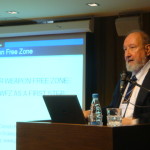Paris and the Long-Term Future
TRANSCEND MEMBERS, ENVIRONMENT, 14 Dec 2015
John Scales Avery – TRANSCEND Media Service
We give our children loving care, but it makes no sense do so and at the same time to neglect to do all that is within our power to ensure that they and their descendants will inherit an earth in which they can survive. We also have a responsibility to all the other living organisms with which we share the gift of life.
Human emotional nature is such that we respond urgently to immediate temptations or dangers, while long-term considerations are pushed into the background. Thus, the temptations of immediate profit or advantage motivate politicians and the executives of fossil fuel corporations; and the temptations of continued overconsumption and luxury blind the general public. Public fears of terrorism have been magnified by our perfidious mass media to such an extent that the equally perfidious French Government has been able to use this fear as an excuse to exclude democracy and proper care for the long-term future from the Paris Climate Conference.
However, our generation has an urgent duty to think of the distant future. The ultimate fate of human civilization and the biosphere is in our hands. What we really have to fear, for the sake of our children and grandchildren and their descendants, is reaching a tipping point, beyond which uncontrollable feedback loops will make catastrophic climate change inevitable despite all human efforts to prevent it.
A feedback loop is a self-reinforcing cycle. The more it goes on, the stronger it becomes. An example of how such a feedback loop could drive climate change and make it uncontrollable is the albedo effect: When sunlight falls on sea ice in the Arctic or Antarctic, most of it is reflected by the white surface of the snow-covered ice. But when sunlight falls on dark sea water, it is almost totally absorbed. This cycle is self-reinforcing because warming the water reduces the ice cover. This is happening today, especially in the Arctic, and we have to stop it.
Another dangerous feedback loop involves the evaporation of seawater, which itself is a greenhouse gas. However, if we think of the long-term future, by far the most dangerous feedback loop is that which involves the melting of methane hydrate crystals, releasing the extremely powerful greenhouse gas methane into the atmosphere. Discussion of this highly dangerous feedback loop seems to be almost completely banned by our mass media.
When organic matter is carried into the oceans by rivers, it decays to form methane. The methane then combines with water to form hydrate crystals, which are stable at the temperatures and pressures that currently exist on ocean floors. However, if the temperature rises, the crystals become unstable, and methane gas bubbles up to the surface. Methane is a greenhouse gas that is much more potent than CO2.
The worrying thing about the methane hydrate deposits on ocean floors is the enormous amount of carbon involved: roughly 10,000 gigatons. To put this huge amount into perspective, we can remember that the total amount of carbon in world CO2 emissions since 1751 has only been 337 gigatons.
httpv://www.youtube.com/watch?v=2bRrg96UtMc
httpv://www.youtube.com/watch?v=MVwmi7HCmSI
httpv://www.youtube.com/watch?v=AjZaFjXfLec
httpv://www.youtube.com/watch?v=W_aMbM20mbg
httpv://www.youtube.com/watch?v=MVwmi7HCmSI
A runaway, exponentially increasing feedback loop involving methane hydrates could lead to one of the great geological extinction events that have periodically wiped out most of the animals and plants then living. This must be avoided at all costs.
The worst consequences of runaway climate change will not occur within our own lifetimes. However, we have a duty to all future human generations, and to the plants and animals with which we share our existence, to give them a future world in which they can survive.
We can also fear a catastrophic future famine, produced by a combination of climate change, population growth and the end of fossil-fuel-dependent high-yield modern agriculture.
These very real and very large long-term disasters are looming on our horizon, but small short-term considerations blind us, so that we do not take the needed action. Nevertheless, what is at stake is the future of everyone’s children and grandchildren and their progeny, your future family tree and mine, also the families of Francois Hollande and the executives of Exxon. They should think carefully about the consequences of making our beautiful world completely uninhabitable.
__________________________________
John Scales Avery, Ph.D., who was part of a group that shared the 1995 Nobel Peace Prize for their work in organizing the Pugwash Conferences on Science and World Affairs, is a member of the TRANSCEND Network and Associate Professor Emeritus at the H.C. Ørsted Institute, University of Copenhagen, Denmark. He is chairman of both the Danish National Pugwash Group and the Danish Peace Academy and received his training in theoretical physics and theoretical chemistry at M.I.T., the University of Chicago and the University of London. He is the author of numerous books and articles both on scientific topics and on broader social questions. His most recent book is Civilization’s Crisis in the 21st Century (pdf).
This article originally appeared on Transcend Media Service (TMS) on 14 Dec 2015.
Anticopyright: Editorials and articles originated on TMS may be freely reprinted, disseminated, translated and used as background material, provided an acknowledgement and link to the source, TMS: Paris and the Long-Term Future, is included. Thank you.
If you enjoyed this article, please donate to TMS to join the growing list of TMS Supporters.

This work is licensed under a CC BY-NC 4.0 License.
Read more
Click here to go to the current weekly digest or pick another article:
TRANSCEND MEMBERS:
- NATO's 5% of GDP Military Expenditures Is a 100% Indefensible and Stupid Idea
- Requisite Appreciation of "Bullshit"?
- Rwanda: Victoire Ingabire Must Not Suffer the Fate of Kizito Mihigo
ENVIRONMENT:
